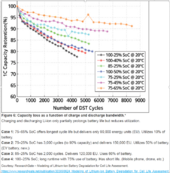Jonathan86
New Member
Are there really thousands of cycles difference between batteries or is it just marketing bs? I'm seeing some server rack batteries with 4000 cycle life, up to 7000+ cycle life at the same DOD% and C rate, and then the new eg4 power pros listed as high as 8000 cycles, and yet they're one of the least expensive batteries, with heaters. From what I've found, all or most seem to be using the same cells. Has anyone seen a significant difference in reliability between battery brands? or anything else to make one an obvious choice over another? I'm building a new system and having trouble deciding on which battery to go with.
Also, how important is communication? I see some say they have communication and some don't and then some specifically have closed loop communication. I'm not sure if it's necessary to spend hundreds of dollars more per battery for the communication, for example, between the two SOK server rack batteries, or if I can use some other device to get the communication feature? I'm building a Victron system.
Thank you.
Also, how important is communication? I see some say they have communication and some don't and then some specifically have closed loop communication. I'm not sure if it's necessary to spend hundreds of dollars more per battery for the communication, for example, between the two SOK server rack batteries, or if I can use some other device to get the communication feature? I'm building a Victron system.
Thank you.



